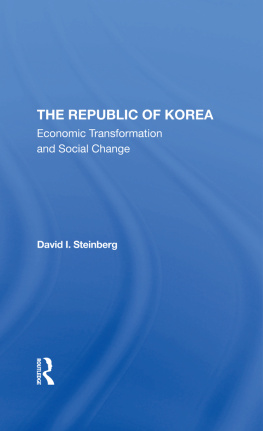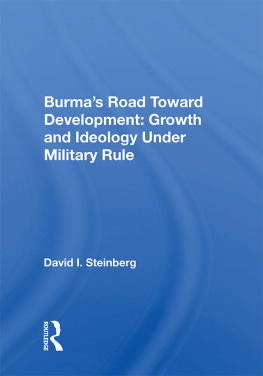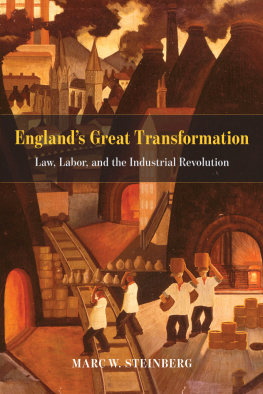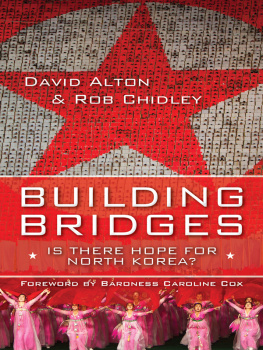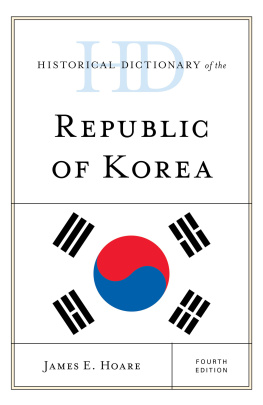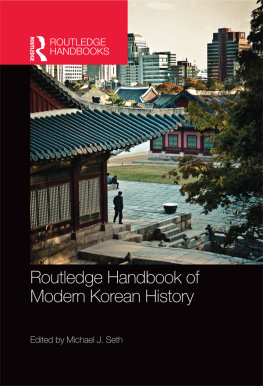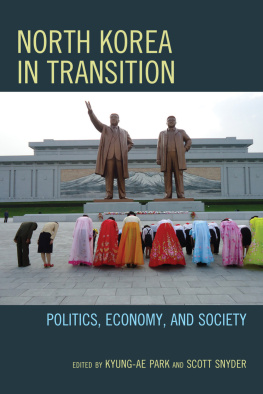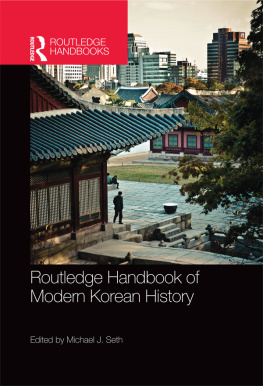THE REPUBLIC OF KOREA
Westview Profiles Nations of Contemporary Asia
Mervyn Adams Seldon, Series Editor
The Republic of Korea: Economic Transformation and Social Change, David I. Steinberg
Thailand: Buddhist Kingdom as Modern Nation-State, Charles F. Keyes
Laos: Keystone of Indochina, Arthur J. Dommen
Bangladesh: A New Nation in an Old Setting, Craig Baxter
Malaysia: Tradition, Modernity, and Islam, R. S. Milne and Diane K. Mauzy
Pakistan: A Nation in the Making, Shahid Javed Burki
Sri Lanka: Portrait of an Island Republic, Tissa Fernando
Vietnam: Nation in Revolution, William J. Duiker
The Philippines: A Singular and a Plural Place, David Joel Steinberg
Burma: A Socialist Nation of Southeast Asia, David I. Steinberg
japan: Profile of a Postindustrial Power, Ardath W. Burks
Nepal: Profile of a Himalayan Kingdom, Leo E. Rose and John T. Scholz
Available in hardcover and paperback.
The Republic of Korea
Economic Transformation and Social Change
David I. Steinberg
First published 1989 by Westview Press, Inc.
Published 2019 by Routledge
52 Vanderbilt Avenue, New York, NY 10017
2 Park Square, Milton Park, Abingdon, Oxon OX14 4RN
Routledge is an imprint of the Taylor & Francis Group, an informa business
Copyright 1989 Taylor & Francis
All rights reserved. No part of this book may be reprinted or reproduced or utilised in any form or by any electronic, mechanical, or other means, now known or hereafter invented, including photocopying and recording, or in any information storage or retrieval system, without permission in writing from the publishers.
Notice:
Product or corporate names may be trademarks or registered trademarks, and are used only for identification and explanation without intent to infringe.
Library of Congress Cataloging-in-Publication Data
Steinberg, David I.
The Republic of Korea: economic transformation and social change
/David I. Steinberg.
p. cm.(Westview profiles/Nations of contemporary Asia)
Bibliography: p.
Includes index.
ISBN 0-86531-720-8
1. KoreaHistory. 2. Korea (South)History. I. Title.
II. Series: Westview profiles. Nations of contemporary Asia.
DS907.18.S73 1989
951.9dc19 88-5750
CIP
ISBN 13: 978-0-367-29548-6 (hbk)
Dedicated to the people of the Republic of Korea and to Koreans everywhere
Writing a single, general volume of prescribed length on a culture as intricate as Korea's is a task to be attempted only with great trepidation. Analyzing the complexities of this unique culture, one so rapidly changing and increasingly assuming a major, pivotal role in the world economic order, is daunting. Tracing comprehensively its historical and evolving relations with its neighbors, its social, economic, and political peregrinations over some two thousand years, if not the five thousand years that is sometimes claimed, is mesmerizing.
Such study for the contemporary period is particularly difficult. Korea is not only constantly evolving physically, socially, and intellectually; it is also the subject of a twentieth-century minefield of disputation. Analysis of the Japanese colonial period and present Korean-Japanese relations heightens nationalistic sentiments and excites tensions on both sides of the Straits of Tsushima; it is significant that the adjacent area is called the Japan Sea in Tokyo and the Eastern Sea in Seoul. The mere mention of North Korea in any but a clearly pejorative sense often produces consternation in the South. The acerbic politics of the various republics of South Korea reflect factionalism and engender vigorous debate. Relationships with the United States are continuously subject to revised analysis as Korean nationalism and anti-U.S. feeling grow, as trade tensions become more acute, and as U.S. documents of the postliberation period are declassified. Korean participation in the Vietnam War has been largely ignored in the academic literature. Because of Korea's rapid growth, it is frequently propounded as a model for economic development, and its rapid expansion has been the source of much folklore and myth for ideological, administrative, and political reasons.
There have been simplistic Western interpretations of Korean history and contemporary politics and economics, and in some sense they may be excused. Until the Korean War, there were few works on Korea in Western languages. Whereas China since Voltaire and Japan since Perry have had pivotal intellectual, artistic, and economic impacts on Western thought and society, Korea was ignored on its own volition until the latter days of the nineteenth century. Overshadowed by the cultural font of East AsiaChinaand by the modernization, military power, and economic pervasiveness of Japan, Korea even when in the limelight seemed a pale imitation of its neighbors.
In the early 1960s, in spite of a military occupation and a prolonged war resulting in the largest U.S. commitment of troops to the Asian mainland until that time, fewer than half a dozen U.S. academicians could be considered "experts" on Korea. Fortunately, that situation has changed. A new, younger generation of Americans and of Koreans writing in English has lifted the mist through which Korea was only dimly perceived by foreigners. These scholars have given depth and breadth to such analyses; as the Korean economy has expanded, so has the study of that society. We are all in their debt.
This book, as one of a series on various countries of Asia, is by its nature limited. It is by intent an overview, an idiosyncratic prcis of continuously evolving trends in the Republic of Korea. (North Korea will be the subject of a separate book.) This book cannot satisfy the specialist; the perceptive generalist will want more detail than the nature of this publication and its length allow. I share this frustration. Yet, if this short work yields a balanced portrait of a valiant and remarkable people, and if my inherent sympathy for the Korean culture and its people, its history and problems, its dynamism and difficulties becomes evident, then the effort will be worthwhile. A quarter-century involvement in Korea, including five years' residence, extensive trips, field research, and a family that is half Korean lead me to hope that these positive emotions are clearly present; but equally, I would also hope that this empathy does not cloud the objectivity of analysis.
Some technical remarks are in order. Various romanization systems have been propounded, some officially authorized. Except in cases in which other romanizations have become accepted or adopted by individuals (for example, Syngman Rhee, Park Chung Hee), I have followed in this book a modified McCune-Reischauer system most commonly used in general publications. Diacritical marks, representing a short vowel sound, are included for Korean words and historical eras or figures (e.g., Kokuryo), as is the long vowel (e.g., wako ). Such marks are eliminated in commonly accepted place names and contemporary names, although the diacritical marks are included in the Dramatis Personae section for reference. Normally, family nameswhich are single syllables with a few exceptionscome first ( Park Chung Hee), except when Western usage has become established, as in Syngman Rhee. The reader new to Korea should note that surnames are limited in that country, and individuals with similar names are unlikely to be related, as 55 percent of Koreans have four surnames: 22 percent named Kim; 18 percent named Lee, Rhee, Yi, etc.all romanizations of the same Chinese character; and so on. Clan location is more important than name.


